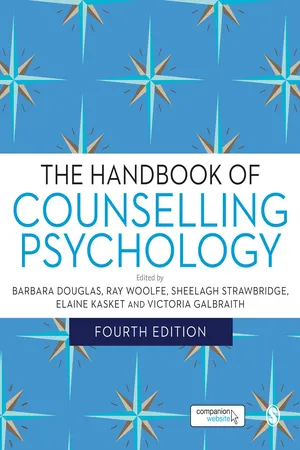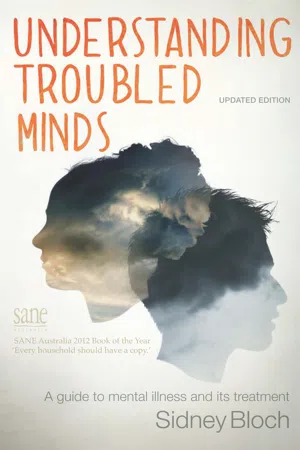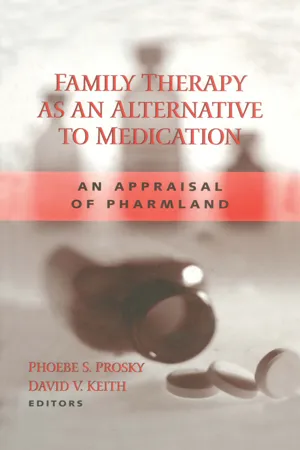Psychology
Drug Therapy
Drug therapy refers to the use of medications to treat psychological disorders. It involves prescribing drugs that can alter brain chemistry and alleviate symptoms such as anxiety, depression, or psychosis. The goal of drug therapy is to restore balance to neurotransmitters in the brain and improve the individual's overall mental health.
Written by Perlego with AI-assistance
Related key terms
4 Key excerpts on "Drug Therapy"
- eBook - ePub
- Barbara Douglas, Ray Woolfe, Sheelagh Strawbridge, Elaine Kasket, Victoria Galbraith(Authors)
- 2016(Publication Date)
- SAGE Publications Ltd(Publisher)
A further set of expectations which a client may hold when first seeking therapy may be around combining these two approaches. It may not have occurred to the client that medication might affect therapy in any way, that there may be unwanted side-effects, that the medication might not be making any difference, that feeling worse may not be evidence of getting worse but may be due to medication, that all drugs are the same, that all therapy is the same, and so forth. Given the powerful position that medical practitioners hold, it may be difficult for clients to realise that the decision about whether to take medication or not is usually theirs and not the role of the doctor or the therapist. If the doctor is sympathetic and caring, as most probably are, it could seem churlish or ungrateful not to accept the help offered or to question it overtly. Just because a doctor offers drugs does not mean he or she is recommending them.Finally, therapy might seem rather vague or imprecise and the therapist may not be able to state clearly what will happen, how soon the client will feel better and how it works. Beliefs about medication being a scientific treatment and therapy being a bit ‘alternative’ might undermine a client’s willingness to engage in what appears to be ‘only talking’. While it may be wise to consider whether the doctor had enough time in the first consultation to discuss the implications of medication in order for the client to make an informed decision, it may be wise to consider what messages about therapy might have been conveyed either overtly or covertly. As alternatives, or in combination, the choice of medication and/or therapy is not a clear-cut issue and the relationship between them is at best uneasy.Pharmacological approaches
Having a clear idea of what drugs are prescribed and for what is the starting point for psychologists who want to begin to build a bridge between pharmacology and psychotherapy. Put simply, most psychotropic drugs alter moods and are either ‘uppers’ or ‘downers’; that is, they are stimulants or sedatives. The second point is to understand that psychotropic drugs belong to a number of groups of similar drugs, so that knowing which group a drug is included in immediately conveys quite a lot of information about the drug. A third point to bridge building is to realise that drugs are known by their generic name by prescribers and pharmacists and in the literature, although they also have brand names which relate to the name given to them by the manufacturer. The one major point of reference is the British National Formulary (British Medical Association and The Royal Pharmaceutical Society, 2008), which gives both generic and brand names and such information as the group, what it is prescribed for (indications), what it should not be prescribed for (contraindications), side-effects, dosage and advice. - eBook - ePub
Understanding Troubled Minds Updated Edition
A guide to mental illness and its treatment
- Sidney Bloch(Author)
- 2014(Publication Date)
- Melbourne University Press Digital(Publisher)
CHAPTER 18 Drugs and Other Physical TreatmentsMost people with mild psychological problems can be treated without medication. But for many with moderately severe conditions and for all of marked severity, drugs and other physical therapies acting on the brain are central to treatment.Physical treatments—which include drugs, occasionally electroconvulsive therapy and very rarely psychosurgery—control symptoms by readjusting those chemical processes in the brain that we assume are disturbed in many mental illnesses. Much of our knowledge comes from looking at drugs that are effective to determine how they work in the brain. We know, for example, that all effective drugs to treat schizophrenia block a specific chemical messenger, dopamine. Working back from this observation, researchers postulate that dopamine activity is increased in schizophrenia.This line of thinking provides a basis for the massive expansion of pharmaceutical research since the 1950s that targets a particular neurochemical system with a view to developing new drugs with the greatest therapeutic effects and the least side-effects. By contrast, treatments prior to the 1950s were non-specific and largely ineffective.Past methods of dealing with mentally ill people reflect what to us now seem bizarre ideas about abnormal behaviour. Common practice in the old asylums included such crude methods as blood-letting, purging, mechanical restraints, twirling-stool therapy and sudden dunking in water (many designed to shock people back into sanity). Patients would risk dying because of exhaustion during excited states like mania, or from infections such as pneumonia due to immobility associated with severe depression, or from suicide.In the twentieth century, psychiatrists embraced great and desperate cures. New treatments to induce a state of semi-coma or deep sleep, and indiscriminate operations on the brain in order to modify behaviour, had their vogue. The 1950s was the key decade for discovery of drugs targeted to specific disorders. Reports on the anti-psychotic properties of chlorpromazine (the first modern tranquilliser) and on the anti-depressant actions of imipramine (the first effective drug for depression) were published. Discovery of the effectiveness of the benzodiazepines in treating anxiety followed soon thereafter. - eBook - ePub
Foundations of Counseling and Psychotherapy
Evidence-Based Practices for a Diverse Society
- David Sue, Diane M. Sue(Authors)
- 2012(Publication Date)
- Wiley(Publisher)
Chapter 17
Understanding Psychopharmacology
Dr. Andrew Mosholder, an FDA medical reviewer, stated that he had been pressured to alter and hide information on documents submitted to congressional investigators concerning the possible link between antidepressant use and suicide in children. (Vedantam, 2004)It is important for mental health professionals to have a working knowledge of the medications prescribed to treat psychological conditions. This is particularly true as more and more people are turning to their physicians for relief from psychological symptoms, combined with the extensive marketing of medications to health care providers and to the public. Many who seek psychotherapy are already taking medication for their symptoms at the time they initiate therapy (Wiggens & Cummings, 1998). It is argued that mental health professionals have the responsibility to be knowledgeable about the biochemical processes involved in the development and treatment of psychological disorders (Rivas-Vazquez & Blais, 1997), and that it is difficult for therapists to provide comprehensive treatment planning, ensure well-being of clients, and minimize professional liability without some background knowledge in psychopharmacology (King & Anderson, 2004). It is well documented that psychotherapeutic intervention can assist clients both in managing adverse effects from medication and understanding the importance of regular adherence to recommended medication schedules (Rivas-Vazquez, Johnson, Blais, & Rey, 1999).If mental health professionals move into discussions of medication with their clients, it is essential that they take the time to examine their own beliefs regarding the use of medication, in general, and in the treatment of psychological disorders. You might want to ask yourself the following questions: Do you believe that psychological problems can have a physiological basis? Do you consider the use of medication necessary with some psychological disorders, but unnecessary with others? If medication is to be used as part of a comprehensive treatment plan, would you recommend that therapy and medication begin simultaneously? If not, which do you believe should start first? Do you hold the view that the use of medication disguises symptoms and is, therefore, a hindrance to the therapeutic process? Do you believe that psychotropic medication should only be prescribed by a psychiatrist, or are you comfortable when such medications are recommended and prescribed by a family physician? Should medication be used only as a last resort? Do you feel frustrated about the extensive marketing of medications and, if so, do these feelings influence your attitudes toward pharmacological interventions? The use of medication in the treatment of psychological disorders is complex from many perspectives. Certainly, it is crucial for the medical practitioners who prescribe medications for emotional issues to have training in differential diagnosis and psychopharmacology. Additionally, it is important for mental health professionals to be informed about research-based and best practice guidelines for specific disorders, regardless of one’s personal or professional opinions. It is essential for mental health professionals to investigate and be knowledgable about ethical and legal aspects of discussing medications with clients. Depending on where you practice and your professional affiliation, there may be ethical or legal restrictions on such discussions, even when the discussion is initiated by the client. - eBook - ePub
Family Therapy as an Alternative to Medication
An Appraisal of Pharmland
- Phoebe S. Prosky, David V. Keith(Authors)
- 2004(Publication Date)
- Routledge(Publisher)
The future of Lifetime Pharmaceuticals has arrived. Now you can obtain the highest quality (insert drug X, Y, or Z) and more in just a few clicks of your mouse. Want to lose weight or stop smoking? Our compassionate and caring staff of licensed physicians are specially trained to be prompt, courteous and discreet. Click on LIFETIME PHARMACEUTICALS right now and see how easy it is to improve your quality of life.Here we can see the healer-patient relationship practically disappeared, as it rests insubstantially between the computer user and the pharmaceutical company. In these situations medical practice has become a medicine show.In the glare of the pharmaceutical industry's pressure to define mental health as a chemical balance in the brain arrived at through the use of its psychotropic medications, the obvious contribution of the forces surrounding a person—the context of relationship and emotion—to that person's state of mind is practically invisible; under intense lobbying pressure, these salient factors are either ignored or given lip service by those who determine mental health policy and disseminate mental health information. The field of family therapy that has grown so dynamically and offered so much promise to people struggling emotionally over the past fifty years has been all but eclipsed by the current emphasis on chemical imbalance and psychopharmacology. This essentially leaves the person who is suffering discomfort to suffer alone, diagnosed with a brain disease for which he or she daily takes a psychotropic medicine. Those around such a person, to whom family therapy would turn for further understanding of the complex systemic functioning of a human being, have been disqualified to lend a hand—except in the sense of “coping”—by this emphasis on brain chemistry. They generally have little medical expertise. Furthermore, they rarely have the opportunity to experience firsthand what their medicated family member experiences. A brief anecdote brings this point into focus.
Learn about this page
Index pages curate the most relevant extracts from our library of academic textbooks. They’ve been created using an in-house natural language model (NLM), each adding context and meaning to key research topics.



